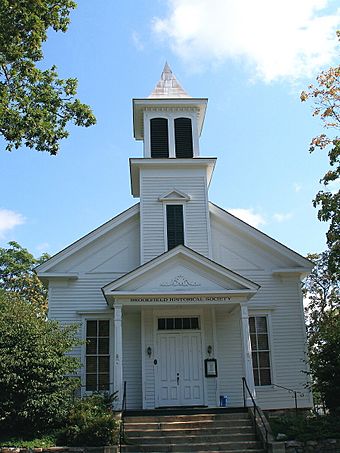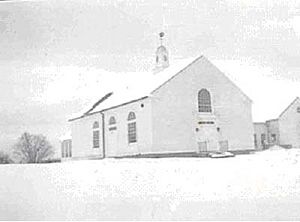Brookfield Center Historic District (Brookfield, Connecticut) facts for kids
The Brookfield Center Historic District in Brookfield, Connecticut is a special area that was added to the National Register of Historic Places in 1991. It's located near where Route 133 and Route 25 meet. This district shows where the town of Brookfield first started. It has 67 buildings, including homes, churches, and town buildings, spread over about 43 acres. These buildings show many different architectural styles from the 1700s to the 1900s, like Bungalow/Craftsman, Greek Revival, and Queen Anne style.
The district includes important places like the old town hall, the Congregational Church of Brookfield, Saint Joseph Church and Elementary School, Center Elementary School, the former general store (now a real estate office), and St. Paul's Episcopal Church. The buildings are well-preserved and still look much like they did when they were built. This helps us understand how the original settlement of Brookfield grew over time.
Quick facts for kids |
|
|
Brookfield Center Historic District
|
|

Brookfield Historical Society
|
|
| Location | Around junction of Route 25 and Route 133, Brookfield, Connecticut |
|---|---|
| Area | 43 acres (17 ha) |
| Built | 1720 |
| Architect | Antinozzi, Frederick H., Associates; Beckwith, Nash |
| Architectural style | Bungalow/Craftsman, Greek Revival, Queen Anne |
| NRHP reference No. | 91000992 |
| Added to NRHP | August 15, 1991 |
What is a Historic District?
A historic district is a special area that has many old buildings. These buildings are important because they show how a town or city grew. They tell stories about the past. When a place is listed on the National Register of Historic Places, it means it's recognized as important to the history of the United States. This helps protect these old buildings for future generations.
Brookfield's Early Days
The area that is now Brookfield was first settled around the year 1700. In 1754, it became its own church parish, formed from parts of Danbury, New Milford, and Newtown. Later, in 1788, it officially became a town.
The main road junction in the district was a very important spot. This is where the first church, town hall, school, and even a tavern were built. Besides being the center for religious and political life, the area also had several private schools in the 1800s.
Buildings with Unique Styles
The Brookfield Center Historic District has many interesting buildings. Each one shows a different style of architecture. Here are some examples:
- 150 Whisconier Road: This house was built around 1700. It's a saltbox style home. A saltbox house has a long, sloping roof at the back, like an old wooden salt container.
- 140 Whisconier Road: This building has some details from the Federal style. This style was popular after the American Revolution. It often has simple, elegant designs.
- Congregational Church: Built in 1854, this church is a great example of Greek Revival architecture. This style was inspired by ancient Greek temples, often featuring columns and grand entrances.
- St. Paul's School (3 Longmeadow Hill Road): This building is in the Italianate style. Italianate buildings often have low-pitched roofs, wide eaves, and tall, narrow windows.
- 1907 Gymnasium Building: This building was once a gym for the Curtis School for Boys. Now, it's the Brookfield Theatre for the Arts. It's built in the Rustic Style, which uses natural materials and has a rugged, simple look.
These buildings help us see how architecture changed over hundreds of years in Brookfield.
 | Madam C. J. Walker |
 | Janet Emerson Bashen |
 | Annie Turnbo Malone |
 | Maggie L. Walker |




